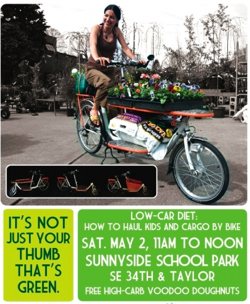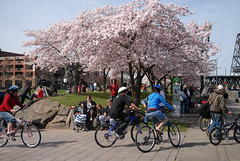
(Photos © J. Maus)
Portland’s transportation future is set to change drastically in the coming years. The stars are aligning for a city — and especially the downtown core — where public transit, feet, and bicycles are the vehicles of choice for most people.
Don’t believe me? Just look around at recent headlines and community and political trends for evidence.
Today we heard two announcements of projects that will have a major impact on the volume of car traffic in the urban core. U.S. Secretary of Transportation Ray LaHood called local officials to announce that Portland has secured $75 million to take its streetcar line across the river. The new line will go from Northwest Portland, across the Broadway Bridge, and then south to OMSI.
We also heard plans from Mayor Adams this morning that the Bureau of Transportation will build a new cycletrack on SW Broadway by removing an existing motor vehicle lane. They also announced plans to unveil another new bikeway design in Portland — the buffered bike lane — sometime next week.
This is propitious timing for streetcars and bikes, given that next week PBOT will launch a series of important open house events for the update of their bicycle and streetcar master plans. Those two plans are being updated simultaneously and, with a vision toward a transformed city in years to come, officials thought it wise to tie those plans as closely together as possible.
The goals of both master plans have one major theme in common; to reduce Vehicle Miles Traveled (VMT). VMT is wonk-speak for how many miles people travel in their cars. It’s a metric used by planners for how well a city does in providing options like biking, walking, and transit.
“Working together to reduce VMT,” was a mantra that came up during a recent meeting about the open houses. Now that’s something I can get behind.
In more VMT news, in Salem last week I listened to a City of Portland lobbyist urge House Transportation Committee members to allow a pilot program in Portland that would tie vehicle registration fees to VMT (read more about that in The Oregonian). No word yet on whether this will be included in the Governor’s big transportation bill, but it shows where the city’s policies are headed.
But that’s just start of what I see as an idea that is gaining serious momentum. You can also see Portland’s low-car future in the local bike scene. We all know how cargo and family bikes have taken off in this city. Clever Cycles on Hawthorne made Portlanders re-think their relationship to bicycles and they’ve reaped the benefits by having a very successful first year of business.

Joe Bike, another shop on Hawthorne and a newcomer to the utility bike scene, has also jumped into supporting the car-free/low-car lifestyle that so many Portlanders aspire to. This weekend, Joe Bike will host a “Low Car Diet Clinic“, that will help show folks how to haul kids and cargo by bike.
If you think going on a low-car diet is some small, inner-Southeast phenomenon, consider a recent, citywide survey by the Bureau of Planning and Sustainability. As part of their Central Portland Plan, they asked people at events throughout Portland about what “Bold steps” they’d like the city to take downtown. Three of the top ten ideas that got the most responses were: “Increase car-free streets and zones”, “Increase and improve bike lanes,” and “Create bike only streets.”
People are beginning to realize that a low-car city is an enjoyable and livable city.
Another person who has noticed these stars aligning is blogger and citizen activist Chris Smith. Smith, who’s also Chair of the Citizen’s Advisory Committee to Portland Streetcar, has been working on what he refers to as “an organizing principle” for “carbon free central city mobility”.

at Ainsworth yesterday.
I’ll sit down with Smith next week to hear more about it, but it’s essentially his way of trying to get people to think about a central city that doesn’t need cars. A big part of his thinking is that by 2011, streetcars will surround the entire central city.
Another group with car-free downtown aspirations are pedicab operators. Several pedicab business owners have recently joined forces to form an organization. According to Portland Cascadia Pedicabs owner Ryan Hashagen, one idea they plan to work on together is a closure of some downtown streets between late-night and early-morning hours (Their concern is the safety risk posed by the high number of people who drive drunk after leaving nightclubs and bars).
To me, all the things above taken together make Portland — especially downtown — primed for a low-car future.
I think a local political leader (Mayor Adams perhaps?) could take all these separate, yet connected trends and push the idea to the next level by starting a “Low Car Diet Fridays” campaign (Commissioner Leonard has already said he likes the idea of a carfree South Park Blocks).
The idea would be to encourage folks to make smart trip choices and perhaps leave their cars at home on one day of the week. There would be no political risk (it’s just a suggestion after all) and it would be a perfect way to help broaden the conversation about trip choice and VMT beyond wonky, planning circles. I think if we focus on trip choices rather than biking specifically, the message would be much more palatable to a larger number of Portlanders.
What do you think?


